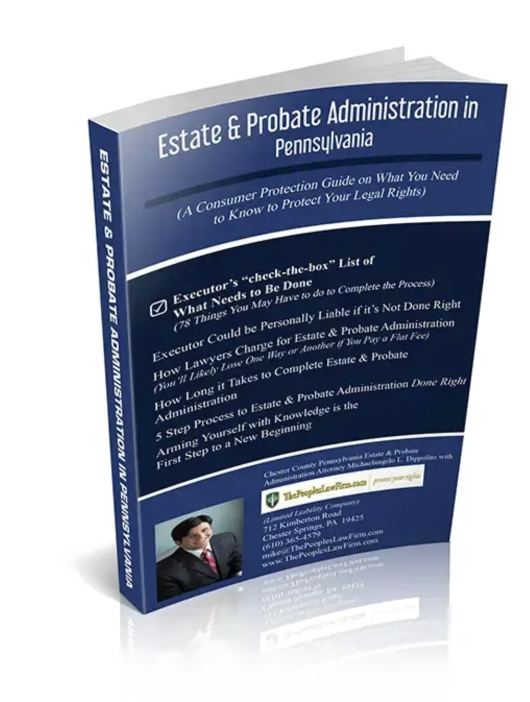The aftermath of a loved one’s death is a distressing time. Every grieving person deserves time to mourn their loss. Unfortunately, the death of a close family member also comes with legal requirements and responsibilities to uphold, especially if you’ve been named as the loved one’s personal representative or executor in their will.
Instead of facing the complex estate administration and probate process alone, you can reach out to an experienced Pennsylvania probate attorney.
Contact ThePeoplesLawFirm.com to learn how attorney Michaelangelo L. Dippolito can guide you through this challenging time.
Why You Should Choose ThePeoplesLawFirm.com for Your Brandywine Estate Law Case
Founding attorney and published author, Michaelangelo L. Dippolito, has dedicated his legal career to helping clients tasked with the often-intimidating prospect of administering a loved one’s estate after their death.
By choosing ThePeoplesLawFirm.com, you have the following advantages on your side:
- An East Brandywine estate administration and probate attorney with a deep understanding of Pennsylvania’s estate and inheritance laws
- Over 26 years of experience, knowledge, and resources behind you throughout the probate process
- An attorney with a commitment to professional excellence and compassionate legal counsel
Probate is the only legal process that places a person with no experience within the legal field into a position that requires them to adhere to a strict legal procedure. Fortunately, you don’t have to navigate this exacting process alone.
Who Is Responsible for Estate Administration After a Death?
When a person creates a will or estate plan, they name a personal representative who is responsible for carrying out their wishes after they pass away. This is sometimes referred to as the executor, agent, or trustee of the estate. The personal representative named in a will or estate plan becomes the probate administrator for the estate after the death.
If an individual dies without a will, the court appoints a probate administrator. Typically, a close family member, such as a spouse, parent, or adult child, steps forward to act as the estate administrator, and the court grants approval.
What Is the Probate Process In Pennsylvania?
During the weeks after a death in East Brandywine or the surrounding area, the probate administrator must begin the probate process. This typically proceeds as follows:
- The probate administrator obtains a certified death certificate and the will and files them with the county’s Register of Wills
- They open a probate case by filing a petition with the county probate court
- They inform the beneficiaries, creditors, tax agencies, and the public of the probate case
- They conduct an inventory of the decedent’s estate and pay any debts and taxes owed, typically according to directions in the will, which may or may not require the sale of property
- They periodically update the probate court on the status of the process
- The estate administrator distributes the remaining assets according to the terms conveyed in the will or dictated by the state’s intestacy laws
The probate administrator is responsible for carrying out the terms of the will and the legal requirements correctly. Unfortunately, they may be held personally liable for any adverse consequences for beneficiaries or creditors if they make an error or oversight in the process.
Hiring an experienced East Brandywine estate administration and probate lawyer minimizes the risk of a costly mistake.
Call ThePeoplesLawFirm.com for Experienced Estate Administration and Probate Attorney In East Brandywine
Instead of navigating the complex probate process alone, contact us at ThePeoplesLawFirm.com for a personalized strategy based on the unique circumstances of your loved one’s estate to ensure the most efficient, low-conflict probate process possible.





